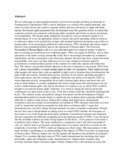| dc.description.abstract | We are witnessing an unprecedented transfer of power from people and their governments to Transnational Corporations (TNCs) whose allegiance is to abstract free-market principle, and whose favored citizens are soulless corporate entities that have the power to shape and break nations. For human rights proponents this development raises the question of how to ensure that corporate activities are consistent with human rights standards and of how to ensure an element of accountability. The human rights obligations assumed by each government require it (or should require it) to use all appropriate means to ensure that actors operating within its territory or otherwise subject to its jurisdiction comply with national legislation designed to give effect to human rights.
In an increasingly globalised world economy, TNCs decisions and actions impact directly on governmental policies and on the enjoyment of human rights. The Universal Declaration of Human Rights calls on 'every individual and every organ of society' to play its part in securing universal observance of human rights. TNCs are organs of SOCiety, and as their operations come under scrutiny around the world, this is increasingly demande~by consumers, shareholders and the communities with whom they interact. Because they have a legal and moral responslblhtv, they must use their influence to try to stop violations of human rights by governments or armed political groups in the countries in which they operate and whom they feed. The silence of powerful business interests in the face of injustice is not neutral. TNCs have also a direct responsibility to respect human rights in their own operations.
Their employees and other people with whom they work are entitled to rights such as freedom from discrimination, the right to life and security, freedom from slavery, freedom of association, including the right to form trade unions, and fair working conditions. Particular care needs to be taken by TNCs to ensure that their security arrangements do no lead to human rights abuses and those who sell arms or other military or security equipment also need to help ensure that their products are not used to violate human rights.
Our task in this thesis is to explore ways in which TNCs could be brought to account for human rights violations. It is worth re-stating the obvious point that corporations owe their status in law to law. From this it follows that they should be challengeable in law. The cultural, social, and political changes associated with the development of highly interdependent global economies helps to explain the rise in debate about corporate liability. It is difficulty to subject to due process without first settling their legal status. International community must put in place an international convention on TNCs through which their activities could be monitored and held accountable for their abuses of human rlqhts.
I argue that international law can effect change through demands on states to regulate corporations. Despite the fact that some of the problems in asking states to control TNGs include: the reluctance of host states to cut off the hand that feeds them, problems of jurisdiction in home state litigation, and more generally the difficulty in pinning down the legal personality of TNCs.
I am convinced that the available evidence provides strong support for the thesis, ~d one purpose or the study is to publicize this evidence. The study emphasizes a comparative and a self-motivated point of view, by which I seek to go beyond a perception that is too narrow and fails to account for the complexity of activities of TNCs which are shaping our affairs today. The main purpose of this study includes contributing to an understanding of the impacts of TNCs's activities on enjoyment of human rights. Whereas chapter one sets the agenda and introduces the problems investigated Chapter Two considers the legal status of TNCs under international law including their legal personality, rights and obligations under international law. Chapter three examines their activities and their impact on human rights. Finally, Chapter Four will conclude the study and put forward suggestions on where legal reforms are necessary to control, monitor and to put to the due process of law questionable activities of TNCs. | en_US |

